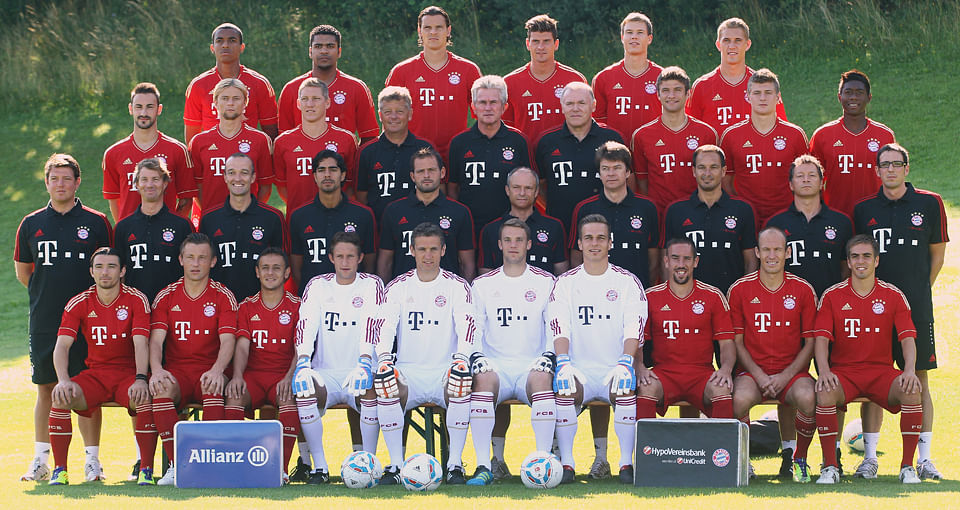


Bayern Munich was founded in 1900 by a group of disgruntled members of another Munich-based club, MTV 1879. These founding members, led by Franz John, were determined to create a team that would challenge the established order and carve out a place for themselves in the German football landscape. In the early years, Bayern struggled to gain traction, often overshadowed by the more successful clubs in the region.
The Allianz Arena, Bayern Munich's current home ground, is a true architectural marvel that has become an iconic symbol of the club's success and ambition. Opened in 2005, the stadium was built to replace the aging Olympiastadion, which had served as Bayern's home since the 1970s.
Despite the ebbs and flows of form and fortune that both clubs have experienced over the years, the Bayern-Dortmund rivalry has remained a constant source of excitement and intrigue for football fans worldwide. Whether it's a top-of-the-table clash in the Bundesliga, a tense cup final showdown, or a high-stakes European encounter, the matches between these two giants of German football never fail to deliver drama and spectacle.
The current Bayern manager, Julian Nagelsmann, has continued this tradition of tactical innovation, implementing a high-pressing, possession-based style that has made the team even more formidable. Nagelsmann's ability to get the best out of his players, combined with his strategic acumen, has been instrumental in Bayern's continued success in the Bundesliga and on the European stage.
The fierce competition between the two has not only produced some of the most thrilling matches in the league's history but has also served as a catalyst for innovation and tactical evolution,with both clubs pushing each other to new heights in terms of player development, coaching strategies, and off-field operations. This healthy rivalry has not only benefited Bayern and Dortmund but has also raised the profile of German football on the international stage, attracting new fans and investment to the Bundesliga.
Moreover, the Allianz Arena has become a fortress for Bayern, with the club's home record being one of the most formidable in European football. The unique atmosphere and passionate support of the Bayern faithful have made the Allianz Arena a daunting prospect for opposing teams, contributing to the club's continued dominance in the Bundesliga and on the European stage.
In the 21st century, Bayern Munich has continued to attract some of the most talented and innovative coaches in the game. Jupp Heynckes, who led the team to a historic treble in 2013, was renowned for his ability to blend pragmatic tactics with a free-flowing attacking style, allowing Bayern to overwhelm opponents with their sheer quality and tactical flexibility.
In more recent years, the arrival of players like Robert Lewandowski, Manuel Neuer, and Joshua Kimmich has further elevated Bayern's status as a global powerhouse. Lewandowski's goal-scoring exploits have cemented his place as one of the best strikers in the world, while Neuer's revolutionary goalkeeping style and Kimmich's all-encompassing talent have helped to maintain Bayern's position at the forefront of European football.
The Allianz Arena is renowned for its cutting-edge design and innovative features. One of the most striking aspects of the stadium is its external facade, which is composed of 2,874 pneumatic cushions that can be illuminated in a variety of colors, creating a mesmerizing display that can be seen for miles.
See more:7m cn livescore
The formation of the Bundesliga, the top professional league in Germany, in 1963 marked a pivotal moment in Bayern Munich's history. The club quickly established itself as the dominant force, winning the first Bundesliga title in the 1965-66 season and going on to secure a record-breaking 30 league championships to date.
As the decades passed, Bayern Munich continued to cement its status as one of the most influential and successful clubs in world football. The club's unwavering commitment to excellence, coupled with its ability to attract and develop world-class talent, has allowed it to maintain its dominance both in Germany and on the European stage.
In addition to its financial success, Bayern Munich has also cultivated a formidable global brand that has become synonymous with excellence, tradition, and innovation. The club's iconic crest, distinctive red and white colors, and rich history have all contributed to the creation of a brand that resonates with football fans around the world.
As Bayern Munich looks to the future, the club's renowned youth academy continues to produce a steady stream of promising young talents, ensuring that the tradition of excellence will be carried on for generations to come. Players like Jamal Musiala, Alphonso Davies, and Serge Gnabry have already emerged as the next wave of Bayern superstars, their youthful exuberance and raw talent hinting at the continued dominance of the Bavarian club.
Bayern Munich's dominance on the pitch has been mirrored by its financial success off it, with the club firmly established as one of the wealthiest and most profitable organizations in the world of football. The club's ability to consistently generate substantial revenue from a diverse range of sources, including broadcasting rights, commercial partnerships, and matchday receipts, has allowed it to maintain a level of financial stability and investment that is the envy of its rivals.
As the club continues to evolve and adapt to the challenges and opportunities of the modern game, Bayern Munich must stay true to its core values of ambition, professionalism, and community to ensure sustained success and relevance in the years to come. By nurturing talent, embracing innovation, and fostering a culture of excellence, Bayern can build on its storied legacy and inspire future generations of fans, players, and football enthusiasts around the world. Bayern Munich is not just a football club; it is a symbol of perseverance, passion, and the pursuit of greatness – a legacy that will endure for another century and beyond.
The 1970s were a particularly golden era for Bayern, as the club won three consecutive European Cup titles (now known as the UEFA Champions League) between 1974 and 1976. This period saw the emergence of some of the greatest players in Bayern's history, including Franz Beckenbauer, Gerd Müller, and Sepp Maier, who together formed the backbone of a team that dominated both domestically and internationally.
The Allianz Arena has become much more than just a football stadium for Bayern Munich; it is a symbol of the club's ambition, a rallying point for its passionate fan base, and a testament to its status as a global powerhouse.
Through strategic partnerships, targeted marketing campaigns, and a strong digital presence, Bayern has been able to extend its reach far beyond the confines of Germany, establishing a loyal following in Asia, the Americas, and beyond. This global brand recognition has not only boosted the club's commercial revenues but has also allowed it to attract some of the most sought-after players and sponsors in the industry, further strengthening its position as a true powerhouse of the game.
In the 21st century, Bayern has solidified its position as a true global brand, with a vast international fan base and a reputation for consistent success. The club's financial might, state-of-the-art facilities, and world-class training program have all contributed to its ability to attract and retain the best players in the world, further strengthening its position as a footballing juggernaut.
The 1990s saw the arrival of another legendary coach, Giovanni Trapattoni, whose strategic flexibility and commitment to defensive solidity helped Bayern to weather a period of transition and emerge as a force to be reckoned with once again.

See more:go88club
At the heart of Bayern Munich's success lies the unparalleled devotion and loyalty of its passionate fan base. From the club's humble beginnings to its current status as a global powerhouse, the Bayern faithful have remained steadfast in their support, providing the team with a level of unwavering backing that is the envy of clubs around the world.
The resilience of this rivalry lies in the deep-seated passion and pride that both sets of supporters have for their respective clubs, with each victory or defeat carrying immense significance and bragging rights. As Bayern and Dortmund continue to evolve and adapt to the ever-changing landscape of modern football, one thing remains certain – the fierce rivalry between these two titans will endure, driving them to new levels of excellence and success.
As the decades passed, Bayern Munich's ability to attract and develop world-class talent has remained undiminished. The turn of the 21st century saw the rise of a new generation of superstars, led by the likes of Phillip Lahm, Bastian Schweinsteiger, and Thomas Müller.
The stadium's cutting-edge design and world-class facilities have helped to solidify Bayern's reputation as one of the most modern and well-run clubs in the world. It has also served as a platform for the club to showcase its brand and engage with its ever-growing international fan base, cementing its position as a truly global entity.

Bayern Munich is a name that has become synonymous with success in the world of football. As one of the most decorated and celebrated clubs in the game, Bayern has cemented its place as a true powerhouse, not just in Germany, but across Europe and the globe. From its humble beginnings to its current status as a footballing juggernaut, the story of Bayern Munich is one of unwavering determination, strategic brilliance, and an unparalleled commitment to excellence.
From the heart-stopping Klassiker encounters, where the fate of the Bundesliga title has often been decided, to the high-stakes clashes in the DFB-Pokal (German Cup) and the UEFA Champions League, the on-field battles between Bayern and Dortmund have become the stuff of legend, captivating football fans around the world with their intensity, skill, and drama.
Lahm's tactical intelligence and defensive versatility made him a cornerstone of the Bayern backline, while Schweinsteiger's boundless energy and technical prowess in midfield allowed him to dominate games with ease. Thomas Müller, on the other hand, has become synonymous with Bayern's relentless pursuit of success, his unique playing style and ability to contribute in multiple roles making him an indispensable asset.
